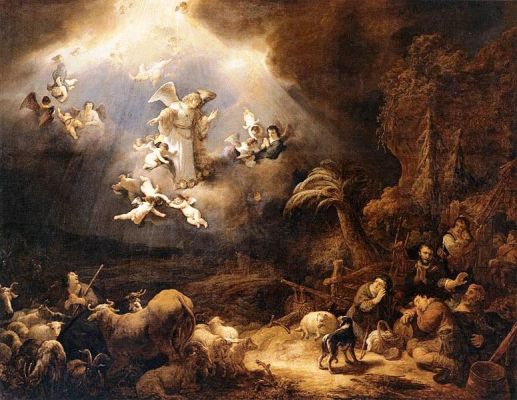 |
| "Angels Announcing the Birth of Christ..." (G. Flinck) |
In the last posting in this series, we began with the obvious observation that the story of the shepherds and the angels began in Luke 2:8 in the every day world of poor working class folks for whom life as short and hard. The Incarnation is not a palace and power thing. It is a real world thing, and the real world is the world of the 99%, especially the bottom rungs of the 99%.
The focus of the Gospel of Luke never leaves the lower classes of folks. The good news of Jesus, the Messiah, was not intended for the wealthy and educated. So much is clear in this story and throughout the gospel.
What is also clear is that being the focus of God's attention was a terrifying thing. This is a theme repeated time and again in the Old Testament. Epiphanies are scary. God was seen to have immense, holy power, which was beyond the control especially of a bunch of poor shepherds. So, fear of God was one factor here. Another one was the more general fear of the unknown. Again, when one is poor the unknown is usually dangerous because it can lead to a loss of resources, which are already few and tenuous. So, as the story goes, the initial reception of the gospel proclamation was not one of joy but of fear. And while the description of the fear of the shepherds may have functioned in ancient times to recall similar Old Testament stories and place this story in that larger context, it also reflects a 21st century reality as well.
The truth is that more people than not greet the possibility of a deeper spiritual life of faith with a rejection that often amounts to fear. One of the central points of faith is the giving up of control, popularly expressed as, "Let go and let God." That is easy to say and scary to contemplate. From the time that we begin to develop our own personality, one of the things we seek to do is gain control over our surrounding environment and "growing up" is about becoming less and less dependent on others and more able to control our own lives. As social creatures, we are constantly negotiating our dependence and independence. The idea, then, that spirituality is about letting go is not a happy one for those who are afraid to let go, afraid of the unknown such an idea leads to, and afraid of losing what independence and self-identity they have. I don't argue that this was the first century meaning of the shepherd's fear in the story. The thought of being confronted by the holy power of God was in and of itself sufficient cause to be terrified. In the 21st century, however, their fear reminds us that faith involves a "fear factor" especially in our consumer-oriented economy where getting is valued and giving up things—well, not so much. In faith, we get only by giving up. Humanly speaking, that is counter-intuitive, and usually greeted with uneasiness, a lack of comprehension, and often enough outright rejection.